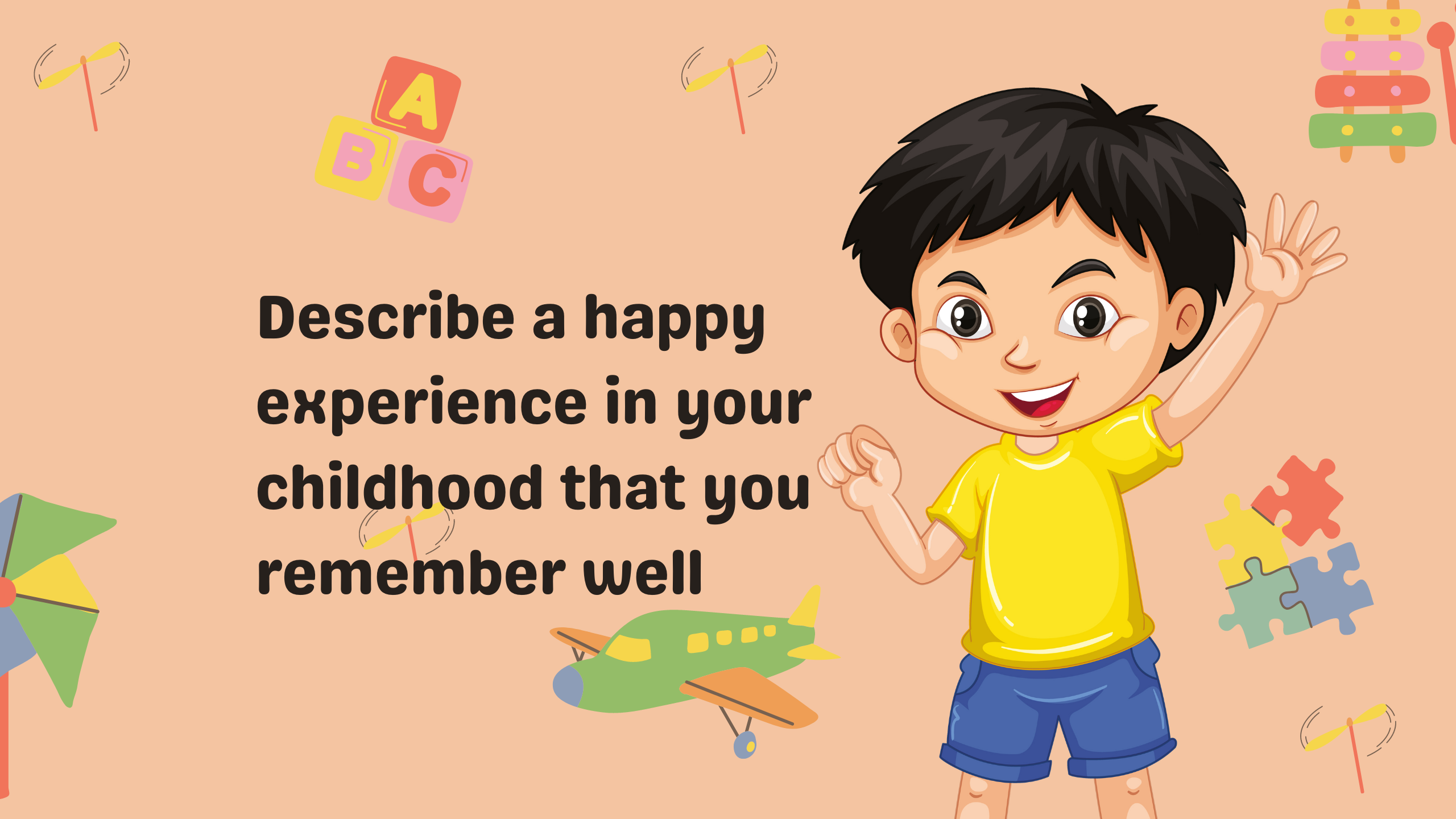
Bài mẫu và từ vựng chủ đề “Describe a happy experience in your childhood that you remember well”
You should say:
– When and where it happened
– Who you were with
– What you saw or did
And explain why you remember it so well
I. Gợi ý lên ý tưởng:
- Về ý thứ nhất: Hoạt động đó là gì? Các bạn nên lựa chọn miêu tả những hoạt động thường ngày. Các bạn có thể nói về môn thể thao, các công việc hàng ngày, hoặc các hoạt động giải trí. Nhưng luôn luôn nhớ, hãy chọn những hoạt động mà mình đã trải nghiệm và quen thuộc.
- Thứ hai: Bạn làm việc đó ở đâu và với ai? Các bạn nên miêu tả ngắn gọn về không gian địa điểm bạn thường xuyên làm hoạt động đó. Có thể kết hợp luôn ý làm việc với ai kèm bày tỏ cảm xúc và lý do tại sao thích làm với họ
- Thứ ba: Tần suất là bao nhiêu lần? Bạn nói ngắn gọn 1 – 2 câu về thời gian, tần suất thực hiện hoạt động đó. Các bạn nên sử dụng trạng từ chỉ tuần suất như always, usually, sometimes, often, once a day/ week/ month,… để miêu tả.
- Thứ tư: Giải thích vì sao bạn thích hoạt động này. Các bạn có thể nói về lợi ích của hoạt động này đem lại. Trong tương lai, các bạn có kế hoạch gì để thực hiện, tiếp tục hay dừng lại.
II. Từ vựng và Cấu Trúc hay cho chủ đề:
- Stay active: duy trì sự chủ động
- Socialize with my friends: giao lưu với các bạn
- Challenge myself: thử thách bản thân
- Improve my physical and mental agility: cải thiện sự linh hoạt của thể chất và suy nghĩ
- Sportsmanship (n): tinh thần thể thao
- Stayed with me throughout my life: đi cùng tôi trong suốt cuộc đời
III. Bài mẫu:
Well, it must have been 25 or 26 years ago, when I was around five. Back then I used to watch cartoons a lot. At that time, I was definitely a couch potato and spent all evening watching TV because both of my parents were working and they didn’t have energy and time for us, I mean my sister and me. So catching a flick was one of the best entertainment options. I vividly remember that whenever my sister and I returned home we would watch BIBI together. Our mother prepared some healthy snacks so we could watch and eat at the same time. We had a whale of time with each other. It was really interesting for us to flick around different channels and opt for our favorite cartoons. Actually, I have a vague remembrance of the name of the cartoons but I know that every day I was so enthusiastic to get home and watch them. Sometimes when I was playing with my sister, we played the roles of cartoon characters and it was really enjoyable for us. Not only did we sing the songs of the cartoons together but we were also impatient to predict the next episode. Although nowadays children have an extensive range of entertainment options, at that time we didn’t have many options to choose from. Somehow we always get along well and have fun together. To put it in a nutshell, whenever I reminisce about those days all good memories come flooding back to me and I get nostalgic. Sometimes I wish I could travel back in time and experience those moments again.
IV. Từ vựng tham khảo:
- A couch potato (n): người lười biếng
- Catching a flick (informal): xem một bộ phim
- A whale of time: khoảng thời gian tuyệt vời
- A vague remembrance: kí ức mơ hồ
- Impatient (adj): háo hức, nôn nóng
- An extensive range of entertainment options: một loạt các sự lựa chọn giải trí
- Reminisce (v): hồi tưởng
- Flooding back: ùa về
- Nostalgic (adj): hoài niệ,
V. PART 3 QUESTIONS
1. What do you think is the most important memory for children?
One of the most important memories for children are those that involve positive interactions with caring adults, such as parents, grandparents, or teachers. Positive interactions with adults can provide children with a sense of security, love, and belonging, which are essential for healthy development. For example, a child who receives hugs and praise from their parents after completing a task can feel loved and valued. This positive interaction can boost their self-esteem, provide a sense of security, and encourage them to keep trying new things.
- positive interactions:
- sense of security
- sense of belonging
- feel loved and valued
- self-esteem
2. What should adults remember?
Adults should remember that children are individuals with their own unique personalities, interests, and needs, and that they should be treated with respect and understanding. One way that adults can demonstrate this is by actively listening to children and showing interest in their thoughts and feelings. For example, a parent could ask their child about their day at school and really listen to their response, rather than just asking out of obligation. This shows the child that their thoughts and opinions are valued, which can help build their self-esteem and sense of self-worth.
- obligation (n): nghĩa vụ
- sense of self-worth: cảm thấy bản thân có giá trị
3. How can we improve our memories?
There are several strategies that can help improve our memories. But what I usually do is repeat information several times which can help reinforce it in my mind and make it easier to recall. This is because repetition helps to strengthen the neural connections in our brain, which can make it easier to retrieve the information when we need it. For example, if you are trying to remember a phone number, you can repeat it to yourself several times to help you remember it better
- neural connections: kết nối thần kinh
4. What can help us to remember our childhood memories?
There are a few things that can help us remember our childhood memories. However, In my opinion, talking to family and friends about shared experiences from childhood can help trigger memories. Our family and friends can also provide us with different perspectives or insights into our past experiences, which can help us remember them more vividly.
- trigger memories: kích hoạt kí ức
5. Why do you think some people can remember things easily?
There are various factors that can contribute to some people having an easier time remembering things than others. One factor is genetics, as research has shown that certain genes can affect memory abilities. Research has identified a few genes that are associated with better memory performance, such as the KIBRA gene and the COMT gene. In addition, these genes are thought to affect the development and function of certain brain regions that are involved in memory formation and retrieval.
- memory formation and retrieval: hình thành và phục hồi trí nhớ


